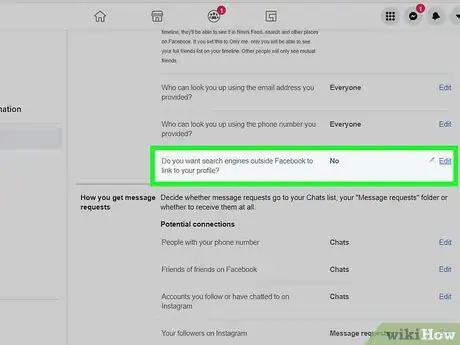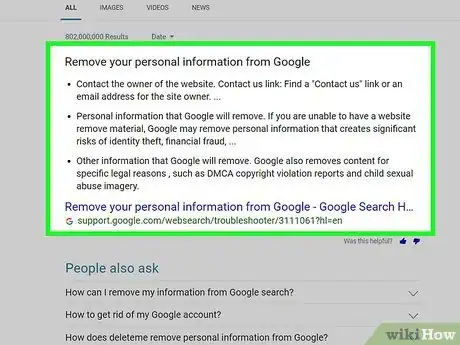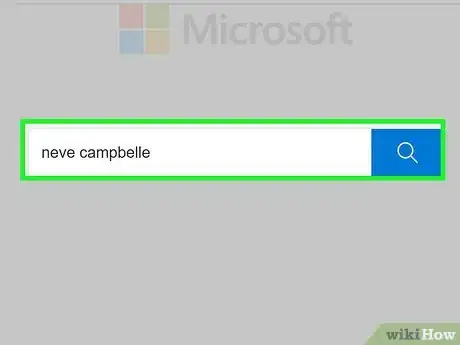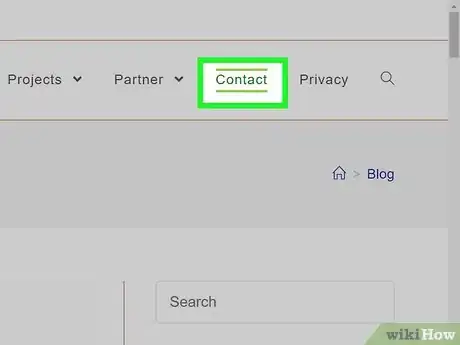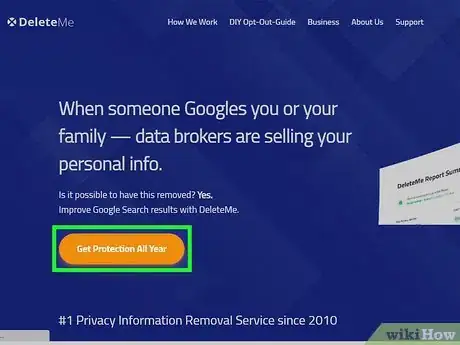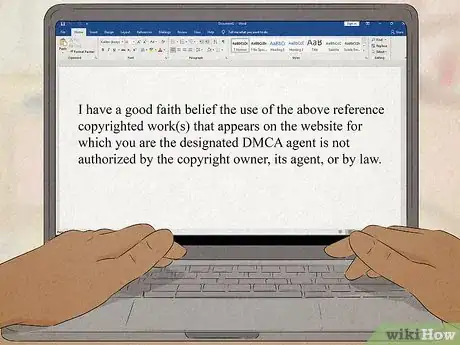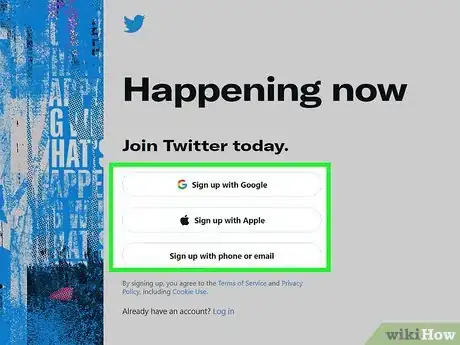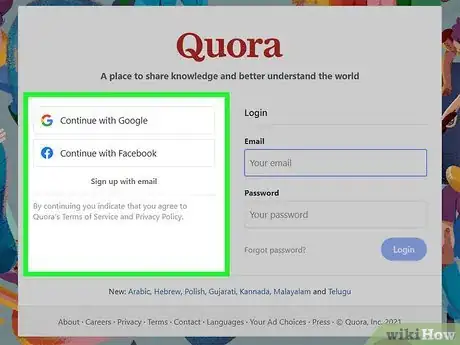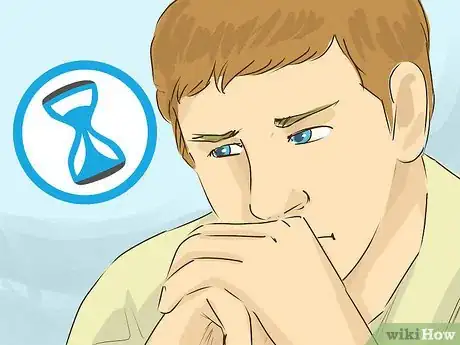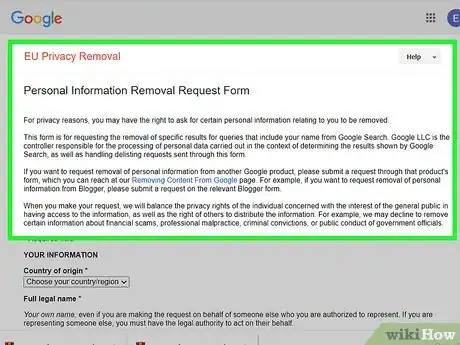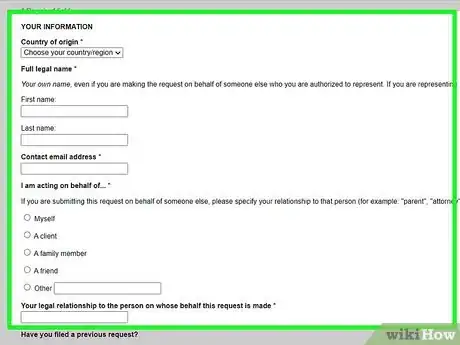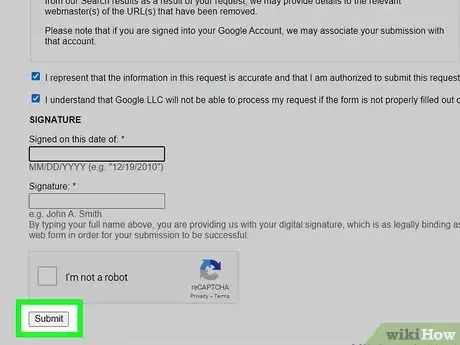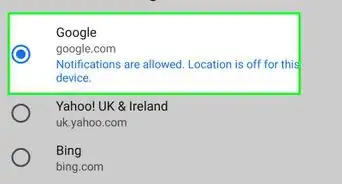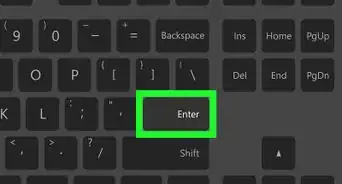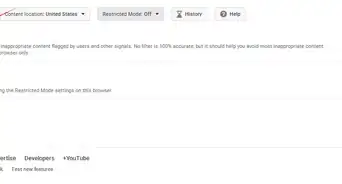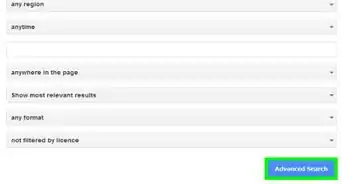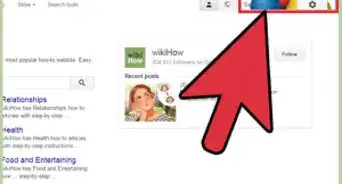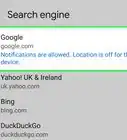This article was co-authored by wikiHow Staff. Our trained team of editors and researchers validate articles for accuracy and comprehensiveness. wikiHow's Content Management Team carefully monitors the work from our editorial staff to ensure that each article is backed by trusted research and meets our high quality standards.
This article has been viewed 194,976 times.
Learn more...
If you've typed your name into a popular search engine, you may have been surprised to find more information than you expected—especially if your name is unique! Maybe you own a business and were disappointed to find negative reviews, or discovered that your full name and address are available for anyone to see. While it's almost impossible to immediately wipe your name from internet search results, there are a few things you can do to make it harder for people to find your information.
Things You Should Know
- Locking down your social media networks is crucial—remove your name from Twitter, and disable Facebook's option to index your profile in search engines.
- Contact websites directly, especially people finder sites, to request that your name be removed.
- Depending on the issue and your location, you may be able to submit a request to Google to remove your name from search results.
Steps
Securing Social Media
-
1Hide your Facebook profile from search engines. When someone searches for your name in Google or Bing, your Facebook profile is typically one of the first results. Fortunately, Facebook has a built-in feature that can hide your profile from search engines. It may take a few days for this change to take effect, but it's one way to better protect your privacy.
-
On a computer:
- Log into Facebook and click the downward triangle ▼ at the upper-right corner of the page.
- Go to Settings & Privacy > Settings > Privacy.
- Scroll down to the "Do you want search engines outside of Facebook to link to your profile?"
- Click Edit and select No.
-
Phone or tablet:
- Open the Facebook app and tap the three-line menu ☰ at the top-right or bottom-right.
- Tap How People Find and Contact You.
- Tap Do you want search engines outside of Facebook to link to your profile? and select No.
- This will only prevent your personal Facebook profile from appearing in Google, Bing, and other search engine results. If you've made posts or comments on public Facebook Pages or groups, they could still appear on Google. If this happens, follow the link and edit or delete your comment/post as needed.
-
On a computer:
-
2Make your tweets private. Does a search for your name bring up your tweets or Twitter profile? You can set your tweets to private so they stop appearing in search engine results. People who are already following you (and anyone new you approve) will still be able to read your tweets, but they'll no longer show up in search engines. It could become harder to gain new followers this way, but it'll keep your content private.
- Log into your Twitter account on your computer, phone, or tablet.
- If you're using a phone or tablet, tap the three-line menu at the top-left. On a computer, click More in the left column.
- Click or tap Settings and privacy.
- Click or tap Privacy and safety.
- On a phone or tablet, toggle "Protect your Tweets" to the On position. On a computer, click Audience and tagging and check the box next to "Protect your Tweets."
Advertisement -
3Change your name on social networks. There's a good chance that the people you care about on your social networks know who you are, so changing your name will help hide your profiles from search engines. This is a bit harder on Facebook, as their real name policy requires you to use the name on your government ID. However, you can make your name anything you want on Twitter or Instagram.
- Twitter: Go to your profile, select Edit profile, and change what appears in the "Name" field.
- Facebook: Click the down-arrow at the top of the page (or tap the three-line menu on a phone or tablet), go to Settings & Privacy > Settings, tap Personal and Account Information (mobile only), and then change the "Name" field.
- Instagram: Go to your profile, tap Edit Profile, and adjust what appears next to "Name."
-
4Delete unused accounts. Sometimes signing up for a website will create an online profile that can turn up in search engines. For example, if you have an Amazon.com account, people may be able to search for your name and find your wish list, reviews, and other details. The best way to tackle this issue is to delete any online accounts you no longer use, and lock down the ones you do use.
- Try to remember the places you've shopped online (or search your email for receipts). Log in to any site you don't plan to use again and either change your name or delete your profile.
- If you've signed up for online forums, such as help forums for services or discussion boards, your posts and profiles could appear in searches for your name. If you can't remember which forums or groups you've signed up for, try searching your email for "Welcome to" or similar.
Removing Personal Information
-
1Know what you can remove from Google. Google doesn't remove much from their search results, but you can file for removing special case information. This includes social security numbers, bank account or credit card numbers, an image of your signature, personal pictures uploaded without your consent, or the name of your business if it was associated with adult spam.
- Remember, this will not remove the content from the web, and it can still be easily accessed by visiting the site. If you want this content removed, you'll need to contact the site owners.
-
2Visit Google's information removal tool. If you feel that you fall into one of the above categories, you can fill out a form to request that the offending URL be removed from Google's search results. Go to this Google support page to get started.
-
3Select "Remove information you see in Google Search". You'll be prompted to select whether the page containing the content is still online or not.
-
4Select the type of content you want removed. You'll be shown a list of all of the types of content that Google will remove from the search results. Once you select the type of information, a detailed form will appear.
-
5Fill out the form. You'll be asked to provide the site URL, as well as your contact information. You'll also need the URL of the search results page that it appears on. Once you have filled out the form, it will be submitted for review.
- If Google verifies that the site is displaying your personal information without your consent, it will remove that URL from its search results. Note that this will not remove the content from the internet, and it can be easily linked and shared through social networks. If you want the content off the internet, you'll need to go through the site owner, the host, or the legal system.
Contacting Websites
-
1Perform searches on yourself. Another thing to check is whether your name appears on various websites. Perform web searches on your name using a variety of different search engines. Add search modifiers like your location to help narrow down the results. Note the top results for each one.
- Instead of just using Google, make sure to search for yourself on other search engines, such as Bing and DuckDuckGo.
- Remember, it's not the search engine that is causing your name to appear, it is content on the web.
-
2Find the site's contact information. Many websites will have contact information in the "Contact" section, or in the footer of the page. Use this contact information to send a request to the site owner to remove the content with your information.
- If the site your name appears on is run by some sort of name indexing company, you may also find a form you can fill out which will request your removal from the site.
- You can use WHOIS, a domain registry database, to attempt to find contact information if none is listed. If the domain was privately registered, your request will be sent to a proxy company, and may or may not be forwarded to the actual owner.
-
3Send a polite message. If something attached to your name is posted on a domain you can't control - for example, a blog post on someone else's blog - a polite, concise email can go a long way. Simply ask them nicely to remove your name from their site. Keep in mind that they are under no obligation to do as you ask; this is why politeness is absolutely crucial to getting them to fulfill your request.
- You may have heard that it is illegal to publish information about someone that is defamatory or slanderous. In truth, determining whether content is defamatory or slanderous is an extremely nuanced legal matter. Additionally, in the United States, there is a loophole regarding slanderous content online in which website owners are not responsible for user-submitted content.[1] For you, this means that again, they are not under any legal obligation to remove said content. Depending on the website, though, sending a polite email request just might get the job done.
-
4Use the Google site removal tool after the content has been taken down. If the site owner cooperates and removes the content, it may still appear in Google's search results. While this will eventually go away, you can speed up the removal process by filing to have that URL removed from the search results. Fill out the form here to have the URL processed for removal.
-
5Contact "people finder" and "411" websites. There are a variety of online directories that may have information about you, including your name, phone number, and address. You'll need to send information removal requests to each of these directory sites. Some of the most popular directory sites include Intelius and Spokeo.[2]
- You can use services such as DeleteMe to automatically contact all of these directory sites with removal requests. This will cost you money, but can be much more time-effective if you want to be thorough.
Contacting Hosting Companies
-
1Determine the host. You can use the WHOIS search to find the host of the website. The host has the power to remove pages, especially if they violate the host's terms and policies. Chances are that most hosts don't allow slanderous or defamatory content, and you can use this to remove your information. Contact the host when the site owner isn't responding or is refusing to remove content.
-
2Send the request to the host. Send a polite but strong message to the host's contact address. If you can, describe the specific policies that the content you want removed is violating. If the host is trustworthy and your claim is legitimate, this will usually be enough to cause action.
-
3Send a DMCA takedown request. If someone is illegally posting your copyrighted content, you can submit a DMCA takedown request to the host.[3] While this won't work for your name or information, since that isn't copyrightable, it can be effective at keeping your work from being spread illegally. Some hosting companies have contact links dedicated to copyright violations, while others will need to have messages sent to the standard contact addresses.
- See How to Write a DMCA Take Down Request for detailed instructions on how to word and send the request.
Improving Your Search Results
-
1Know when to take this approach. If you just can't get someone to take down negative information about you, the best course of action is to try to bury it in good content. This means you may be actively taking the opposite approach of removing your name, since you'll want lots of results for your name that are positive.
-
2Sign up for every major social network. Since the goal of this is to bury a negative piece of content, you'll want to create as much neutral and positive content as possible. This includes social networks, as these are often ranked highly in search results. Sign up for every major social network and make sure your accounts are set to be publicly-viewable.
- Sign up for Facebook, Twitter, LinkedIn, Pinterest, Instagram, and any other popular networks.
-
3Create profiles and post on public forums. Create accounts on sites like Quora, GitHub, Stack Exchange, and other public sites. All of these will contribute to your search results. Once you've created a profile, make some helpful posts on popular threads to increase the chance that your name will be linked to it in a search result.
-
4Register your real name as a domain name. This URL will shoot to the top of any search for your name because it is an exact match.
- It also helps to include a link to this domain on your public social media profiles. The more a URL is linked to from an outside source, the higher up it will appear in search results.
- Use this opportunity to market yourself or your business. Include some positive information, especially if you are trying to bury content that doesn't put you in a very good light.
-
5Start a blog. If you really want to make a dent on your search result, a popular blog will go a long way. This will take a lot of time, but is probably the most effective way to bury a bad article or page. You can start a blog for free using WordPress, Squarespace, or a variety of other services. Try to post at least once a week to start building up content.
-
6Ask happy customers for positive reviews. If you run a business and are trying to bury a bad review, ask your satisfied customers to consider leaving a review on Yelp or Google+. Enough good reviews could quickly drown out a negative one.
-
7Be patient. It may take weeks or months for your content to overtake the negative piece, especially if it is popular. Even if you go with a paid service, it will likely take a significant amount of time for the search result rankings to change.
Using "Right to be Forgotten" (EU)
-
1Visit the search removal page for Europe. If you reside in the European Union, you may have Google review your data and decide if it is eligible to be removed from the search results.[4] To do this, you'll need to fill out a form indicating what results you want removed. Not all requests will be granted, and public information such as criminal convictions, malpractice, and financial scams will likely not be removed.
- Go to the form page to begin submitting the request.
-
2Fill out the form. You'll need to include your name as well as the name that retrieves the results you want to remove. You'll also need to include specific URLs for search results that you want to get rid of. Each URL you add will need an explanation as to why you think it should be removed (outdated, irrelevant, objectionable, etc.).
-
3Wait for your request to be approved or denied. If the information is deemed not of public interest, then the results will be removed from Google search results. It may take a while for your request to be reviewed, and even longer for it to be processed.
Taking Legal Action
-
1Know when this is necessary. If the site owner and the host are refusing the remove your content, you may have to resort to legal measures. This will be most effective if either the site owner or the hosting company are in the same country as you.
- Remember, this method will only be useful if the content that is posted is actually illegal (slanderous, defamatory, copyright). It is not illegal for someone to just post your name on a website.
-
2Contact a lawyer to draft an "intent to sue" notice. This is the cheapest option, and is often good enough to scare the recipient into taking down the content. You only need a few hours of the lawyer's time to perform this, so it shouldn't cost too much. Send the notice to both the site owner and the hosting company.
-
3Get a court order. This is the most expensive solution, and should only be attempted if you are absolutely sure the content is illegal. You'll have to pay legal fees, unless you are able to win your case and have the site owner or host pay them. Consult with a lawyer to determine if this is the correct course of action for you. You'll have a very hard time even getting a court date if the host is from a different country.
- See How to Get a Court Order for more information on filing a court order.
Warnings
- It is almost impossible to get content immediately and permanently removed from the Internet. If you manage your expectations of what can realistically be removed from search results, you will save yourself a lot of frustration and worry.⧼thumbs_response⧽
References
About This Article
1. Make your social media content private.
2. Change your name on social media.
3. Ask site owners to remove your name from their websites.
4. Contact the hosting company if a site is being uncooperative.
5. Improve your preferred search results.
6. Use the EU's Right to Be Forgotten law.
7. Take legal action if necessary.
